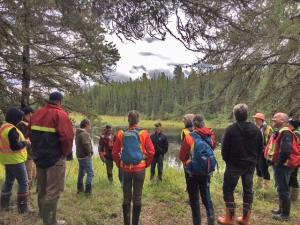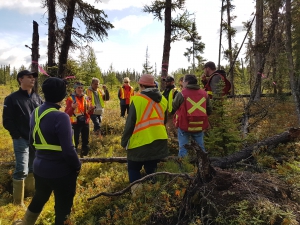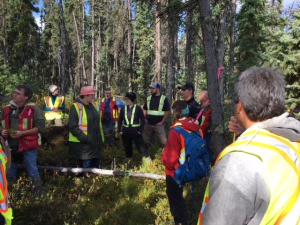Woodlands team receives wetlands training under new partnership with DUC
In late August, representatives from Ducks Unlimited Canada (DUC) travelled to Whitecourt to deliver wetlands training to Millar Western’s woodlands team, fulfilling one of the commitments under a recently signed memorandum of understanding (MOU) to form a Boreal Wetland Stewardship Partnership. Under the MOU, DUC and Millar Western are committed to working together on several projects to ensure effective stewardship of wetland and waterfowl resources within the Millar Western Forest Management Area (FMA), located in Alberta’s commercial forest.
The classroom and field components of the training provided the woodlands team with an opportunity to not only strengthen their  knowledge of wetlands but to also learn specifically about the types and distribution of wetlands in Millar Western’s Forest Management Agreement (FMA) area and their role in the region’s forest ecology. DUC also shared insights into new research about the functionality of wetlands and impacts related to disturbances and climate change. The knowledge gained will help Millar Western to conserve these important forest features on the landscape and meet evolving regulatory and certification commitments regarding hydrology and wetlands.
knowledge of wetlands but to also learn specifically about the types and distribution of wetlands in Millar Western’s Forest Management Agreement (FMA) area and their role in the region’s forest ecology. DUC also shared insights into new research about the functionality of wetlands and impacts related to disturbances and climate change. The knowledge gained will help Millar Western to conserve these important forest features on the landscape and meet evolving regulatory and certification commitments regarding hydrology and wetlands.
“Wetlands deliver many goods and services, including commercial timber, water storage and filtration, and carbon storage,” said Al Richard, Head of Conservation Partnerships of DUC’s Boreal Program, who joined the group for the field portion of the training session. “We are teaming up with companies like Millar Western to provide them with knowledge and skills they need to protect these complex water systems that are vital to biodiversity in the boreal forest, including healthy waterfowl populations, which are of special interest and concern to us at DUC.”
 While critical to the health of the boreal forest, wetlands can be difficult and costly for forest companies to operate in, particularly when building infrastructure. “Operationally, wetlands present a number of challenges,” said Millar Western’s Chief Forester, Bob Mason. “Being able to accurately identify the types of wetlands we are dealing with and how they behave can avoid a number of unwelcome situations, such as road-base saturation, culvert sinkage, and road rutting and ponding. Equipped with a better understanding of wetlands, we will, with greater confidence, be able to build infrastructure that is safe for workers and appropriate for the conditions, with minimal environmental impacts.”
While critical to the health of the boreal forest, wetlands can be difficult and costly for forest companies to operate in, particularly when building infrastructure. “Operationally, wetlands present a number of challenges,” said Millar Western’s Chief Forester, Bob Mason. “Being able to accurately identify the types of wetlands we are dealing with and how they behave can avoid a number of unwelcome situations, such as road-base saturation, culvert sinkage, and road rutting and ponding. Equipped with a better understanding of wetlands, we will, with greater confidence, be able to build infrastructure that is safe for workers and appropriate for the conditions, with minimal environmental impacts.”
“Knowledge of wetlands can serve as decision support tools,” said Kylie McLeod, Conservation Programs Specialist, with DUC’s BMP (Best Management Practices) Program, who along with Leanne Mingo, also a Conservation Programs Specialist also with DUC’s BMP Program, delivered the training. “Where avoidance is not possible, companies can incorporate wetlands knowledge to develop practical mitigation strategies and help to maintain wetland hydrology.”
The training session proved instructive to DUC as well, with representatives learning more about company operations in and around wetlands. “This exchange of information will provide a foundation for the development of practical, science-based BMPs that will help guide forest industry operations in wetlands,” said Leanne. “Working together, we can help to sustain boreal wetlands and the many critical functions they perform.”
 Millar Western and DUC are also members of the landmark Forest Management Wetland Stewardship Initiative (FMWSI) A partnership between DUC and the forest products industry, FMWSI is a visionary approach to advancing sustainable forest management and wetland stewardship in the boreal forest. FMWSI will deliver other technical support materials to participants, including a decision-making tool for assessing and mitigating the risk of incidental take of waterfowl nests, which is expected to be released later this fall.
Millar Western and DUC are also members of the landmark Forest Management Wetland Stewardship Initiative (FMWSI) A partnership between DUC and the forest products industry, FMWSI is a visionary approach to advancing sustainable forest management and wetland stewardship in the boreal forest. FMWSI will deliver other technical support materials to participants, including a decision-making tool for assessing and mitigating the risk of incidental take of waterfowl nests, which is expected to be released later this fall.
With wetlands training, BMPs, and additional support material through FMWSI, Millar Western’s team will be better equipped to make more informed decisions when working in and around wetlands.